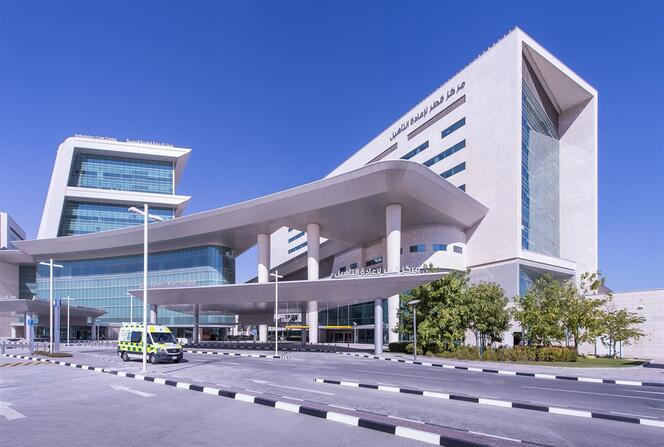
With reporting from Reem Saad
Yesterday, we ran the first in our series of stories on giving birth in Qatar, outlining some of the systemic problems in delivery rooms across the country.
In this second installment, mothers and health practitioners share what kind of care and support is (and isn’t) offered after giving birth in Qatar.
For many mothers, the weeks after giving birth can be a difficult time, as they struggle to feed their babies, adjust their sleep schedules and get used to life with an infant.
Support from trained professionals can be key, but also lacking in Qatar.
This is especially true when moms need help breastfeeding, learning basic baby-care skills and battling feelings of depression, according to several midwives, doulas and mothers.
Lack of breastfeeding support
All of the women Doha News spoke to express concerns about an absence of support for breastfeeding.
This is despite a drive to increase its uptake in Qatar, where the breastfeeding rate is very low.
According to Qatar’s National Health Strategy 2011-2015, a 2012 study found that 29 percent of women here exclusively breastfed their infants for up to 6 months.
That’s compared to 37 percent globally – and far below the World Health Organization’s target of 50 percent.

Australian midwife Tracey Tootell, who worked in Qatar for two years as a doula, said this is because mothers are often discouraged from breastfeeding while they are still in the hospital
She told Doha News that she had seen many nurses tell mothers that they were not producing breast milk, so they must give their babies formula instead.
“I have seen doctors in NICU (intensive care) tell women that they would kill their babies if formula was not given,” she added.
Additionally, even when mothers tried to breastfeed, no proper instruction was given and, and in some cases, the advice was incorrect, Tootell said.
Meanwhile, doula Amy Gieson said that she had observed nurses in private hospitals in Qatar giving formula without consent during their initial checkups.

This happened to American expat Katherine, who shared this experience after giving birth in Al Ahli hospital:
“They took my baby and told me it was for a checkup, but they fed him formula,” she said. “Then when I was trying to nurse him he spit it up everywhere. It was only then they told me they had given him formula.”
Al Ahli did not respond to repeated requests for comment.
However, most mothers said that their wishes were adhered to if they firmly told hospital staff that they intended to breastfeed.
For example, South African mother-of-two Janine Muller said that she was able to keep her son in the room with her at Doha Clinic and that she breastfed him exclusively, after some insistence:
“Nurses kept asking to take him away and give him a bottle so I could rest, but I firmly/gently reminded them of my birth plan and then they left me alone,” she said.
Changes afoot
Despite these issues, medical professionals are working to improve breastfeeding outcomes in Qatar.
In the past few years for example, Hamad Medical Corp. (HMC) has introduced several new measures to encourage mothers to nurse their babies.
This includes specialist training for doctors and nurses, an outpatient clinic for moms who are struggling, and a breastfeeding room in the Women’s Hospital Neonatal Intensive Care Unit (NICU).

In a statement to Doha News, HMC added:
“During the first hour of a baby’s life, we promote breastfeeding by placing a newborn on a mother’s chest. This immediate skin to skin contact helps promote mother-baby bonding and stimulates milk supply.”
Some mothers said they have noticed the difference.
American expat Katherine gave birth at Hamad Women’s Hospital in January last year. Her baby was placed in the NICU and she used the facilities provided there to help feed her daughter.
“They gave me a hospital-grade pump while I was there and a free pump to take home as well as sterilized bottles to fill. They had a pump room in the NICU, milk storage and encouraged me to nurse my baby as soon as she was able to be held,” she recalled.

According to one HMC doctor, Hamad Women’s hospital had made breastfeeding a priority, and now has specialized staff (both doctors and health educators) to support mothers.
However, a short stay in a busy hospital might make it difficult to meet with them, she said.
At Doha Clinic, meanwhile, Dr. Tareq Shabaan said while the hospital encouraged breastfeeding due to its “great benefits,” he acknowledged that mothers were not getting enough support, and that the hospital was “working on this.”
The hospital never gives formula to babies without maternal consent, he added.
Practical skills
Though breastfeeding support has improved, many moms in Qatar struggle with caring for their babies once they’ve left the hospital.
This is partly because neither HMC nor local private hospitals offer home visits post-birth, relying on parents to visit their doctor if they have any concerns.

Tootell said that when she joined the Positive Birth Group Doha, a group for new and expectant mothers on Facebook, she was amazed by some of the questions that were being asked:
“I figured that there was something terribly wrong in the country, if a woman with a baby had to rely on the answers provided by other mothers rather than by medically trained practitioners. I was dumbstruck.”
She added that many new parents she had worked with in Qatar had not been taught basic baby-care skills.

She recalled often doing home visits, showing parents how to change diapers, bathe and dress their babies and put them down to sleep safely – “simple things that should have been shown in hospital.”
Addressing these concerns, HMC told Doha News that its work was “not done” once the patient was discharged:
“There is a new mother’s care team at each of our Primary Health Care Corporation (PHCC) facilities to schedule appointments for mother and baby including vaccinations, breastfeeding support and regular check-ups,” it said.
Post-natal depression
One other big issue in Qatar remains a lack of mental health support.
Mothers in many countries are routinely assessed for signs of depression post-birth, but this is not protocol in Qatar, in either the private or public healthcare systems.
Tootell told Doha News that many of the women she had worked with had shown signs of post-natal depression, and that their husbands “had no idea how to support them.”

Sometimes, women must be referred to a psychiatrist for diagnosis and medication if needed.
Despite these restrictions, HMC said that support was available for those who needed it.
HMC added that it is hoping to launch a “midwifery-led postnatal care team” in the near future that would support new mothers at each of its facilities across Qatar.
Thoughts?
The third story in our series about Giving Birth in Qatar – about how healthcare professionals here handle miscarriages and other complications – follows tomorrow.







